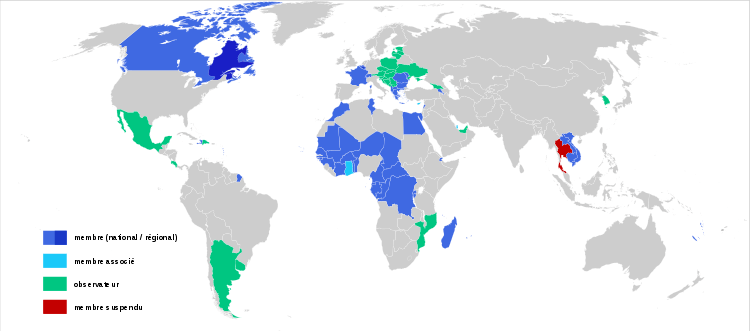Francophonie

Map showing the member states of the Organisation internationale de la Francophonie (in blue and green)
Francophonie is the quality of speaking French. It is not to be confused with the Organisation internationale de la Francophonie, sometimes also informally called "la Francophonie". The term designates the ensemble of people, organisations and governments that share the use of French on a daily basis and as administrative language, teaching language or chosen language.
Denominations
Francophonie, francophonie and francophone space are syntagmatic expressions that are sometimes misunderstood or misused. They can be synonymous but most of the time they are complementary.
- "francophonie", with a small "f", refers to populations and people who speak French for communication or/and in their daily lives.[1]
- "Francophonie", with a capital "F", can be defined as referring to the governments, governmental and non-governmental organisations or governing officials that share the use of French in their work and exchange.[1]
- "Francophone space", "Francosphere" represents not only a linguistic or geographic reality, but also a cultural entity: for example describing any individual who identifies with one of the francophone cultures, may it be Slavic, Latin, Creole, North American or Oceanian for example.[2][3]
See also
References
- 1 2 "Qu'est-ce que la Francophonie ? - Organisation internationale de la Francophonie". www.francophonie.org.
- ↑ "Données et statistiques sur la langue française - Organisation internationale de la Francophonie". www.francophonie.org.
- ↑ L'année francophone internationale, Québec, ACCT, 1994
This article is issued from
Wikipedia.
The text is licensed under Creative Commons - Attribution - Sharealike.
Additional terms may apply for the media files.